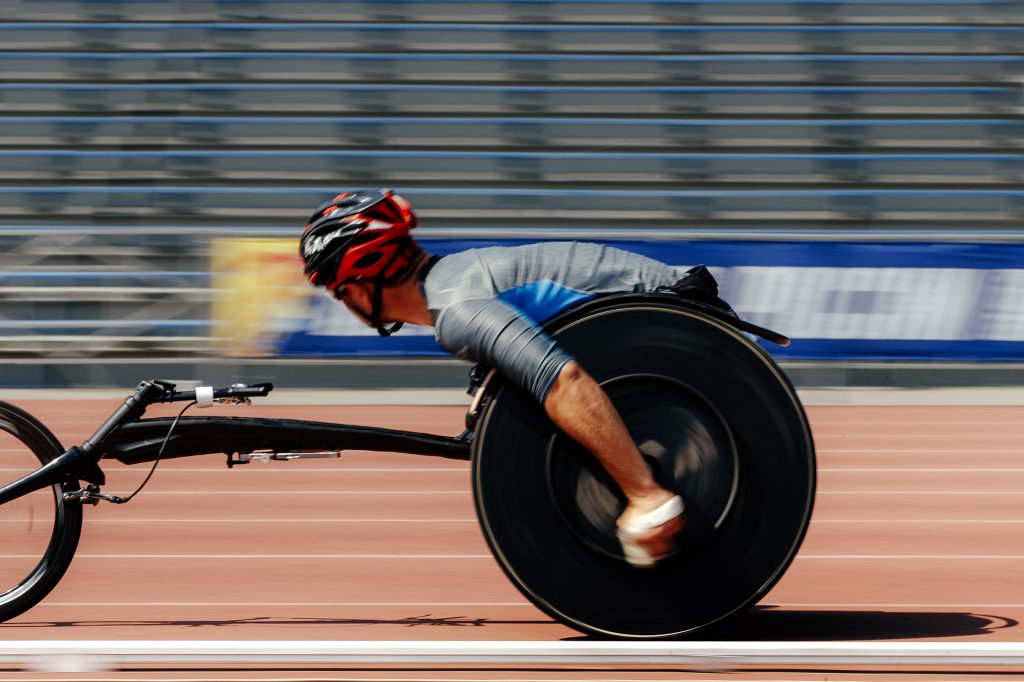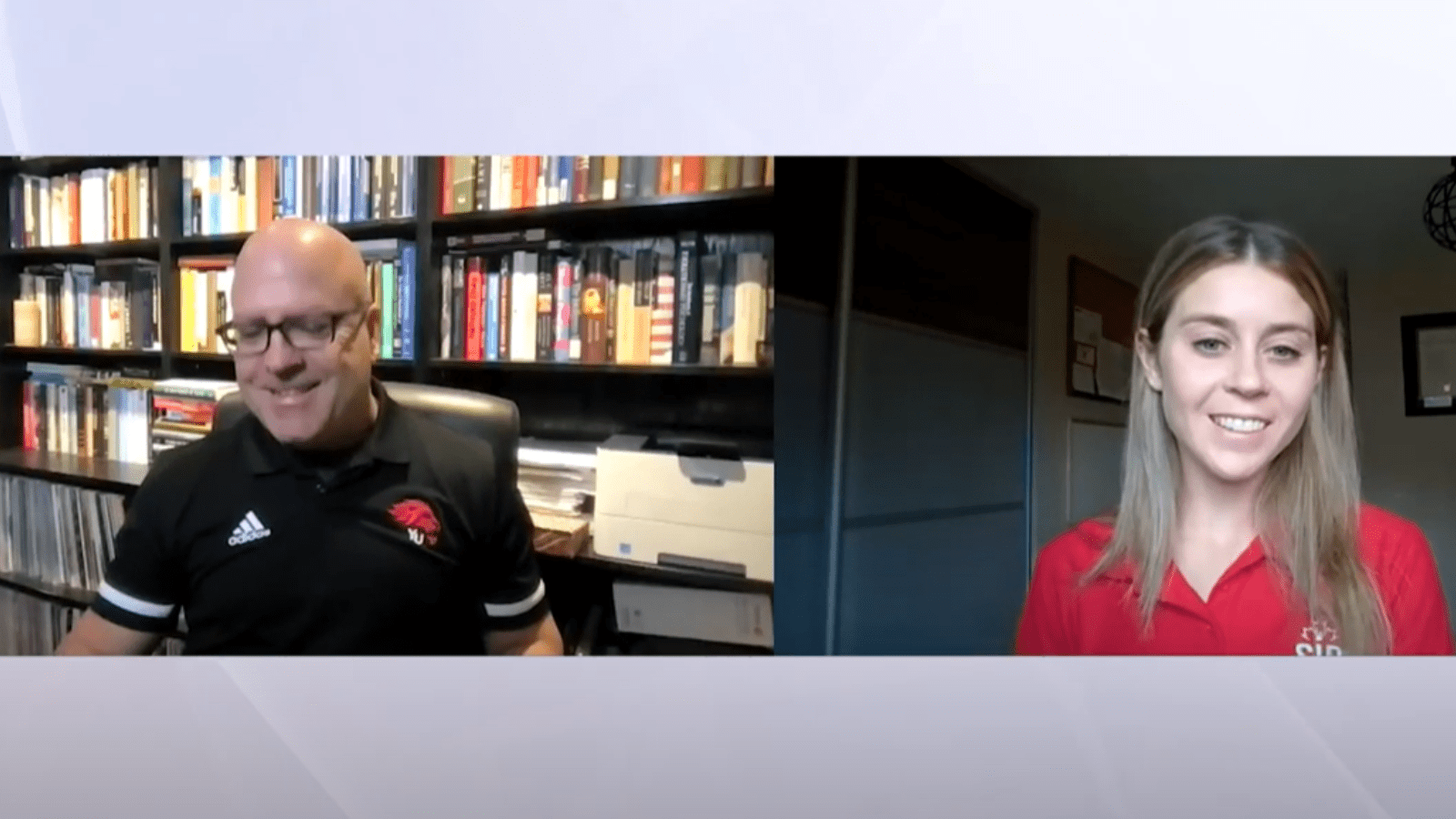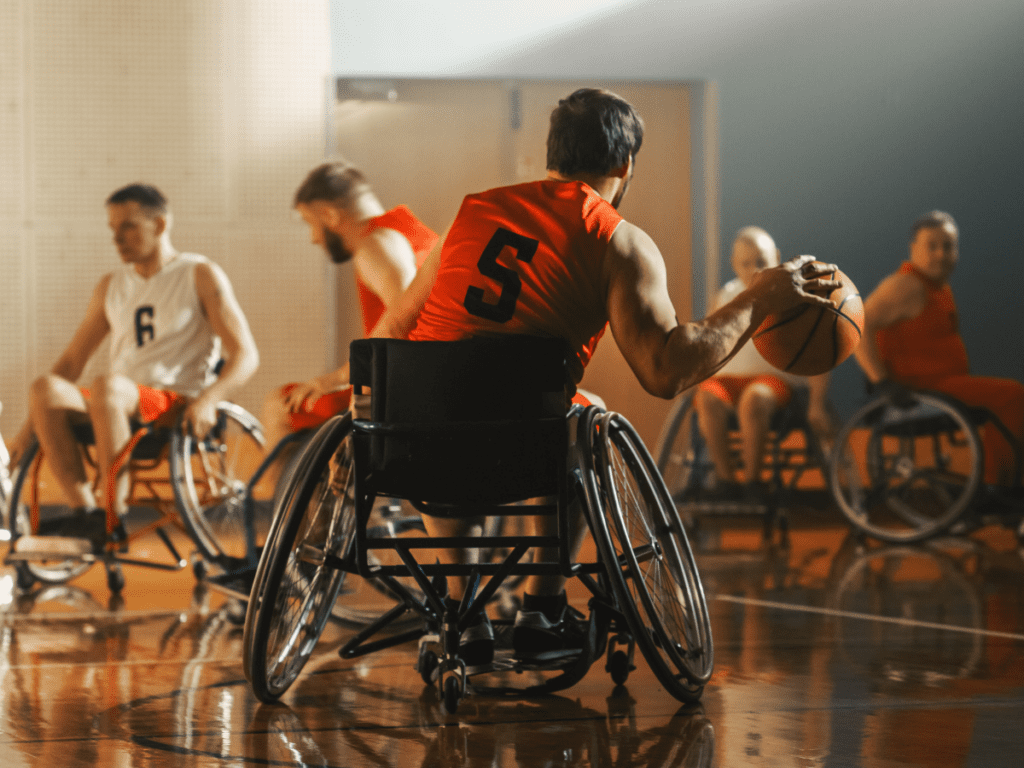Athletes with a Disability
Sport can be adapted and recreated to create positive experiences athletes with a disability. Explore topics like mixed ability sport, classifications, removing barriers, and more below.
Search Athletes with a Disability Resources
Top 10 resources
- SCRI – Driving Change Spotlight: Mixed Ability Sport
- SCRI – Athlete development in parasport: The Canadian Paralympian Project
- SIRC Article: Athletes2Coaches: A mentorship program for athletes experiencing disability
- SIRC Article: Tips to engage adults with intellectual and developmental disability in sport and physical activity
- SIRCuit Article: The history of Para sport in Canada
- The Blueprint for Building Quality Participation in Sport for Children, Youth, and Adults with a Disability including Quality Participation Checklist Audit Tool
- Coaching Athletes with a Disability e-Learning Module and Guide
- Becoming Para Ready 2.0
- Online Psychological Skills Training for Para athletes
- Training and Managing Disability Sport Event Volunteers: Recommendations and Resources

Featured resource
Jessica Ferguson and Tim Konoval

Featured resource
York University and SIRC

Featured resource
David Legg
Quick Facts
What is Para sport?
According to the Canadian Paralympic Committee, “Para sport” is a term used to describe sport that is primarily aimed at persons with a disability. It comes from the idea that it is parallel to sport for able-bodied athletes, sometimes with adapted equipment or rules to make the game fun and accessible for everyone.
There are 27 sports on the Paralympic program. These include sports and sport classifications designed for people with impaired muscle power, impaired passive range of movement, limb deficiency, leg length difference, short stature, hypertonia, ataxia, athetosis, vision impairment, and some intellectual impairments. However, a wide range of adapted sports and spot models exist for people with a variety of disability types beyond the 27 sports included in the Paralympic Games.
What is sport classification?
Classification is the system that “determines which athletes are eligible to compete in a sport and how athletes are grouped together for competition. This, to a certain extent, is similar to grouping athletes by age, gender or weight” (International Paralympic Committee).
The classification system has been designed so that athletes who succeed in competition do so on the basis of their sporting ability including their technical skill, fitness, mental focus, and tactical ability. Athletes are classified according to their activity limitation resulting from their disability which is termed “impairment” in the context of classification.
For more information about classification, please visit the Canadian Paralympic Committee webpage.
What are mixed ability sports?
Mixed Ability does not mean Mixed ‘disabilities’. The Mixed Ability model focuses on creating a safe, supportive and welcoming space for all individuals in the community, respecting and valuing the diverse backgrounds and intersecting identities that make up the fabric of our communities. Using a universal design approach within various sport environments, Mixed Ability Sport allows for full inclusion not only for individuals with disabilities, but also those returning to sport, those who are new to sport, and any individual in our communities as equal, valued members of the club.
In this way, Mixed Ability Sport differs significantly from other approaches that promote separate or adapted offerings for participation. The model emphasizes the need for regular, and sustainable team offerings on mainstream sport teams through practice, competitions, and social engagement for individuals of any background or ability without classification, divisions, or labels. Players with and without disabilities play together on the same team.
Learn more about Mixed Ability Sport on the Abilities Centre webpage.
What is the difference between adapted and modified sport?
Adapted sport is when the activity is changed so that people with disabilities can participate alongside their able-bodied counterparts. There may be changes to the sport environment, teaching, activities, etc.
Modified sport is when there are changes to the skills and abilities required to participate in the sport so that the person with disabilities can participate to the best of their own abilities.
What are some of the most common barriers for athletes with disabilities participating in sport?
There are numerous barriers that people with disabilities face when participating in sport and they are some of the things that your organization can become to tackle as part of making sport accessible. Items such as lack of awareness on how to include people with disabilities in sport, lack of accessible facilities and transportation, attitudes towards people with disabilities, and limited access to information and resources.
Quite often, education is the biggest tool. How can you make your sport more accessible? Is getting into the facility difficult? Is there a lack of equipment? Are there coaches who know how to instruct individuals who have disabilities? Tackling these questions will often go a long way to making sport more accessible.
The biggest thing to remember is that athletes with disabilities are not a homogenous group, there is a wide range of disabilities and severity of disability. The athletes will know best how to provide accessible sport, so including them in the discussion is crucial.
Where can I learn more about opportunities and resources for people with disabilities in sport?
Whether you are an athlete, parent or guardian, coach, volunteer, or sport organization, the following organizations and websites will connect you with the information and resources you need about sport for persons with disabilities:
- ParaSport Ontario Resource Hub: A comprehensive resource hub covering everything you need to know from equipment to policy for athletes, coaches, activity leaders, educators and volunteers.
- Canadian Paralympic Committee: Your go-to source of information for high performance Para sport, including the Paralympic Games.
- Special Olympics Canada: Your go-to source of information for sport for persons with intellectual disabilities in Canada, including resource and programs for athletes, coaches and volunteers.
- Coaching Association of Canada: The Coaching Association of Canada teamed up with the Canadian Paralympic Committee to create resources for the development of Para sport coaches.
What’s the difference between the Paralympic Games, the Special Olympics, and the Deaflympics?
The Paralympic Games are an Olympic-style high performance multi-sport competition hosted every four years (in the same year as the Olympic Games) for athletes with disabilities. Like the Olympic Games, Only the best athletes in the world compete at the Paralympic Games following a rigorous qualification process. For more information, visit paralympic.ca.
The mission of Special Olympics is to provide year-round sports training and athletic competition in a variety of Olympic-type sports for children and adults with intellectual disabilities, giving them continuing opportunities to develop physical fitness, demonstrate courage, experience joy and participate in a sharing of gifts, skills and friendship with their families, other Special Olympics athletes and the community. For more information, visit specialolympics.ca.
The Deaflympics are an international multi-sport competition hosted exclusively by and for members of the Deaf community. For more information, visit deaflympics.com.
What major events include events for athletes with disabilities?
There are many events that include events for athletes with disabilities. The most obvious one and the biggest one is the Paralympic Games, taking place every four years. The Commonwealth Games also have some para events to include those with disabilities. On the continental level, there is also the Parapan Am Games, which happens the year before each Paralympic Games. At the national level, we also have Canada Games, which includes able-bodied athletes and those with physical and/or intellectual disabilities. Many National Sport Organizations will also have national championships for para disciplines, depending on the disciplines existing within the sport.
Video Resources
Disability in Sport | Sport chez les personnes ayant un handicap
- McGill University, University of Windsor, Paralympics Australia, Western University, University of British Columbia, and SIRC
- 2021
Do sport events matter for parasport participation? Lessons & opportunities in event leveraging
- Western University, University of the West of Scotland, Mount Royal University, and SIRC
- 2022
SCRI 2023 Plenary: Supporting adaptive Snowsports Leisure Opportunities for People with disabilities
- Supporting Snowsports Leisure Opportunities for People with disabilities, SIRC, and University of Illinois at Chicago
- 2023
Children’s Sport & Physical Activity | Sport et activité physique chez les enfants
- York University, University of Ottawa, Université de Montréal, and SIRC
- 2021
Internationalizing the approach to concussion management in para athletes
- The Football Association, University of Portsmouth, British Journal of Sports Medicine, and SIRC
- 2024
SCRI – Athlete development in Para sport: The Canadian Paralympian Project
- York University and SIRC
- 2021
Knowledge Nuggets
knowledge nuggets
Share the benefits to being active
The Assisting, Informing and Motivating Physical Activity (AIMPA) works to improve access to sport and physical activity for children and youth with disabilities. Through their
The Assisting, Informing and Motivating Physical Activity (AIMPA) works to improve access to sport and physical activity for children and youth with disabilities. Through their research, AIMPA developed five recommendations. The third recommendation encourages organizations to share the benefits of being active, such as better health, new friendships, and greater confidence. Seeing these positive outcomes can help families feel motivated to support their children’s participation.
knowledge nuggets
Clear information removes barriers to participation
The Adaptive and Inclusive Movement for Physical Activity (AIMPA) works to improve access to sport and physical activity for children and youth with disabilities. Through
The Adaptive and Inclusive Movement for Physical Activity (AIMPA) works to improve access to sport and physical activity for children and youth with disabilities. Through their research, AIMPA developed five recommendations. One point urges organizations to give families clear, easy-to-find details about programs, staff, and facilities. This transparency removes barriers and helps families feel confident in getting their kids involved.
knowledge nuggets
Celebrating the heart of special olympics coaches
During National Coaches Week, we’re highlighting a study capturing the voices of Special Olympics Canada coaches. Beyond sport, they manage routines, ease nerves, and guide
During National Coaches Week, we’re highlighting a study capturing the voices of Special Olympics Canada coaches. Beyond sport, they manage routines, ease nerves, and guide athletes through new experiences. Their stories reveal the often unseen, but vital side of coaching, and highlight the many roles Special Olympics coaches play in supporting athletes.
knowledge nuggets
Expanding parasport opportunities for young athletes
Many young athletes with disabilities get involved in sport by chance, often through disability-specific organizations. Researchers have found their parents play a key role, handling
Many young athletes with disabilities get involved in sport by chance, often through disability-specific organizations. Researchers have found their parents play a key role, handling everything from logistics to coaching. Yet parents often feel overwhelmed due to limited resources and support. Expanding inclusive programs and better supporting families could help reduce barriers and promote more sustainable participation.
knowledge nuggets
Mentorship program for parasport coaches
Mentorship can be a powerful way to support parasport coaches. A recent study found that a virtual mentorship program helped coaches feel more confident, use
Mentorship can be a powerful way to support parasport coaches. A recent study found that a virtual mentorship program helped coaches feel more confident, use inclusive terminology, and learn more about coaching athletes with disabilities. The study recommends continuing mentorship programs to help coaches progress, connect, and grow in their roles.
knowledge nuggets
Socioeconomic status and sport participation
Socioeconomic status can greatly influence sport participation. For example, a study of more than 1000 youth showed that kids from less affluent families tried fewer
Socioeconomic status can greatly influence sport participation. For example, a study of more than 1000 youth showed that kids from less affluent families tried fewer sports, had lower rates of overall sports participation, and were less physically active. Reducing common barriers, such as providing affordable sport programs and transportation options, may help to make sport more accessible for everyone.
knowledge nuggets
Promoting physical activity for youth with disabilities
Youth with disabilities experience several barriers to sport participation. In a recent review of the academic research, researchers highlighted the importance of “finding the right
Youth with disabilities experience several barriers to sport participation. In a recent review of the academic research, researchers highlighted the importance of “finding the right balance” in terms of the level of challenge and supports provided. They also identified social connections, social support, and an appropriate physical environment as essential factors in finding the right balance.
knowledge nuggets
Barriers to growing adaptive sport
What’s stopping people with physical disabilities from staying active after rehab? This study dives into the gaps in community sport programs and reveals surprising opportunities
What’s stopping people with physical disabilities from staying active after rehab? This study dives into the gaps in community sport programs and reveals surprising opportunities for growth. Discover how better communication and stronger partnerships could change the game.
More Disability resources
|
|
|
|
|
|
|
|
|
|
|
|